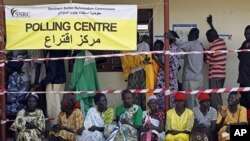Thousands of voters in southern Sudan lined up before dawn Sunday as a week-long referendum opened on whether to remain part of a united Sudan or separate to form Africa’s newest nation.
Voters in southern Sudan lined up at polling centers, singing and dancing, as the long-awaited referendum on independence began.
The head of the regional government, Sudanese Vice-President Salva Kiir, urged them to be patient as he cast the first ballot.
"This is a historic moment the people of southern Sudan have been waiting for," said Kiir. "And I would like to call upon all the southern Sudanese people to be patient in case one does not get time to cast his or her vote today. You have more days that you can cast your vote."
The referendum is part of a six-year-old peace agreement that ended two decades of civil war in which two-million people died.
The widow of the founder of the struggle, Rebecca Garang, said her husband John Garang, who died in a helicopter crash shortly after signing the peace accord, would be rejoicing.
"When I see this day I see that my husband has not died in vain," she said. "I know he has achieved it. I know freedom has a price."
Many northern Sudanese want Africa’s largest country to remain united. But for southerners, who feel they were treated as second-class citizens, the referendum is the reward of years of suffering and struggle.
A security guard, Abraham Ajok, 32, said he came to vote for separation from Sudan because he has seen improvement during the six years of semi-autonomy.
"When we vote for independence everything will change like in the economy, the social," he said. "All those things will change."
Pastor John Yual of the International Church of Nesarin said he hoped the referendum would bring peace.
"People have been traumatized because of war," he said. "I think the healing will come slowly, but it already has started coming."
In the village of Gumbo, across the Nile River, Angat Garang, 26, nursed her baby outside the polling station after voting.
She says that whatever government emerges from the referendum, she hopes it will improve education in a region where only six percent of the population can read.
U.S. actor and Sudan activist George Clooney, stopping by for a visit, called it an emotional event.
"It is an amazing thing to see after 55 years of people fighting and dying for their independence to get the opportunity to go for independence," said Clooney. "You do not see that very often in your life. It is an honor to be here and watch."
Ghar Malual Ghar, 24, was voting at Juba University. A child soldier in the Sudanese People’s Liberation Army who grew up in the bush, he now has a scholarship to study economics at the school.
"The last time that I voted I was just voting for a person who is alive to become a prime minister, to become a minister, to become a parliamentarian. But now the people I am standing here for are those who have died. It is because of them, that they paid the ultimate price, that makes me stand here today," he said.
International observers expressed satisfaction about the first day of balloting and said they hoped the situation would continue until polls close on Saturday.




